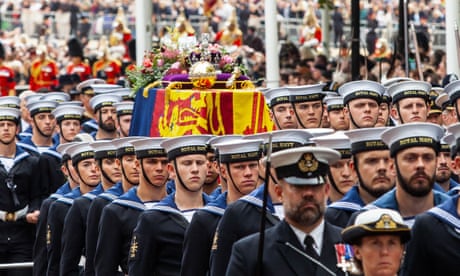- by foxnews
- 08 Apr 2025
The Guardian view on the Queen’s funeral: stirring emotions that transcend logic | Editorial
The Guardian view on the Queen’s funeral: stirring emotions that transcend logic | Editorial
- by theguardian
- 20 Sep 2022
- in news

The body of Queen Elizabeth II was laid to rest on Monday beside that of her husband in a private ceremony in the King George VI memorial chapel at Windsor Castle. The country's longest-serving monarch was taken on a 25-mile journey from Westminster Hall, where her body had lain in state for hundreds of thousands of people, some waiting in a queue for almost a day, to file past to pay their respects.
To those who could not get to London to witness the pageantry and pomp of the royal cortege, every major television network beamed live images for her son's subjects - and the world - to watch. How many people felt moved by the Queen's death, and how many were not, will likely never be known. However, her funeral confirmed that the symbolic power of the monarchy has risen even as its political power has declined.
Royal rituals are contrived affairs meant to generate popular attachment to a privileged institution and to serve as reminders of a glorious past. Monarchy's power rests upon a central myth; that traditions and ceremonies have remained unchanged over 1,000 years of family drama. In reality the parades and commemoration services have been invented, and reinvented, to preserve the monarchy's relevance. However, they are also essentially ephemeral, devoid of anything more powerful than that which is sentimental and evocative. How much Britain will be changed once this moment floats past the country is as yet unknown.
If a shift has taken place, the question of what was the nature of it - and what exactly shifted - remains unanswered. At times it has felt over the last week that there has been a striking absence, bar honourable exceptions, of voices sceptical of the crown. Cowing people into silence won't end discussions about the monarchy's role in modern life. The police's heavy-handed response to the small handful of anti-royal protesters was particularly ill-judged. The law still permits bad manners and poor taste. Even at a time of national grief for many people, Britons ought to be able to exercise their right to free speech.
At times it felt like the ground rules of our country could not be talked about. It is not necessary for such a debate to be conducted in a respectful manner - but it would be better if it was. The monarchy is the crowning anachronism of British society and a wave of infantilising coverage, and some real sorrow for a loved monarch, seems to have muffled any talk of reform. Yet in a fractured kingdom, the departure of the Queen ought to give pause for thought about what it means for her son to take over. Since Charles instantaneously became King on his mother's death, it already feels too late. As the playwright George Bernard Shaw observed: "Kings are not born: they are made by universal hallucination."
There is nothing rational about monarchy. As events this week have demonstrated, the royal family is closer to a religion, stirring emotions that transcend logic but appeal to mystical triggers deep within our collective psyche. Perhaps the death of the monarch sparked an upsurge in community and solidarity. But such feelings can disappear as quickly as they came. What remains is monarchical power without much accountability. The great success of Elizabeth II as Queen was to keep her exercise of power out of the public view, so that it was not threatened by public scrutiny.
Yet the royal prerogative - to deploy the armed forces, make and unmake international treaties and to grant honours - is unchecked. Although exercised by ministers in the crown's name, these powers lie at the heart of the constitution and largely beyond judicial reach. King Charles III may think it is time to become more visibly active in public life or, wary of public opinion, might opt for a more ceremonial role. The evidence so far suggests the former. It's hard to imagine the late Queen letting it be known - as her son, the King, did last Friday - that there were royal concerns that people would not be able to cope during a "difficult winter", especially as the cost of living crisis did not prevent a 17% increase in palace spending last year.
Parliament is the place to decide if - and how - the monarchy should be remodelled. With the Conservative government apparently moving to implement a radical pro-business agenda of reducing workers' rights and increasing bankers' bonuses, old social and political relationships are threatened with disruption as new ones are established. In such an era of change and flux, it is bizarre that the crown remains territory where parliamentarians fear to tread.
- by foxnews
- descember 09, 2016
Ancient settlement reveals remains of 1,800-year-old dog, baffling experts: 'Preserved quite well'
Archaeologists have recently unearthed the remarkably well-preserved remains of a dog from ancient Rome, shedding light on the widespread practice of ritual sacrifice in antiquity.
read more


